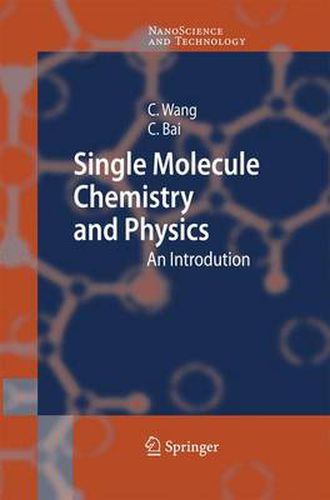Readings Newsletter
Become a Readings Member to make your shopping experience even easier.
Sign in or sign up for free!
You’re not far away from qualifying for FREE standard shipping within Australia
You’ve qualified for FREE standard shipping within Australia
The cart is loading…






This title is printed to order. This book may have been self-published. If so, we cannot guarantee the quality of the content. In the main most books will have gone through the editing process however some may not. We therefore suggest that you be aware of this before ordering this book. If in doubt check either the author or publisher’s details as we are unable to accept any returns unless they are faulty. Please contact us if you have any questions.
Single-molecule studies constitute a distinguishable category of focused - search in nanoscience and nanotechnology. This book is dedicated to the - troduction of recent advances on single-molecule studies. It will be illustrated that studying single molecules is both intellectually and technologically ch- lenging, and also o?ers vast potential in opening up new scienti?c frontiers. We wish to present the readers with several di?erent techniques for studying single molecules, such as electron-tunneling methods, interaction-force m- surement techniques, optical spectroscopy, plus a number of directions where further progress could be pursued. We hope the work may assist the readers, especially graduate students and those who wish to explore single molecules, to become familiarized with the pace of the progress in this ?eld and the relevant primary techniques. Due to limitation of space, we are not able to elaborate on the technical details of all of the experimental methods that are vital in single molecule studies, so introductions to only selected experimental methods are touched in the context. Since the technical details and theoretical analysis of these techniqueshavealreadybeenthoroughlycoveredinmanyliteratures,weonly provide introductions to the basic principles of the detection techniques here, and focus on their experimental achievements in the area of single-molecule studies. These techniques have proven to be highly e?ective when indep- dently used. The combinationof those techniques could lead to further - vances in the detection capabilities.
$9.00 standard shipping within Australia
FREE standard shipping within Australia for orders over $100.00
Express & International shipping calculated at checkout
This title is printed to order. This book may have been self-published. If so, we cannot guarantee the quality of the content. In the main most books will have gone through the editing process however some may not. We therefore suggest that you be aware of this before ordering this book. If in doubt check either the author or publisher’s details as we are unable to accept any returns unless they are faulty. Please contact us if you have any questions.
Single-molecule studies constitute a distinguishable category of focused - search in nanoscience and nanotechnology. This book is dedicated to the - troduction of recent advances on single-molecule studies. It will be illustrated that studying single molecules is both intellectually and technologically ch- lenging, and also o?ers vast potential in opening up new scienti?c frontiers. We wish to present the readers with several di?erent techniques for studying single molecules, such as electron-tunneling methods, interaction-force m- surement techniques, optical spectroscopy, plus a number of directions where further progress could be pursued. We hope the work may assist the readers, especially graduate students and those who wish to explore single molecules, to become familiarized with the pace of the progress in this ?eld and the relevant primary techniques. Due to limitation of space, we are not able to elaborate on the technical details of all of the experimental methods that are vital in single molecule studies, so introductions to only selected experimental methods are touched in the context. Since the technical details and theoretical analysis of these techniqueshavealreadybeenthoroughlycoveredinmanyliteratures,weonly provide introductions to the basic principles of the detection techniques here, and focus on their experimental achievements in the area of single-molecule studies. These techniques have proven to be highly e?ective when indep- dently used. The combinationof those techniques could lead to further - vances in the detection capabilities.